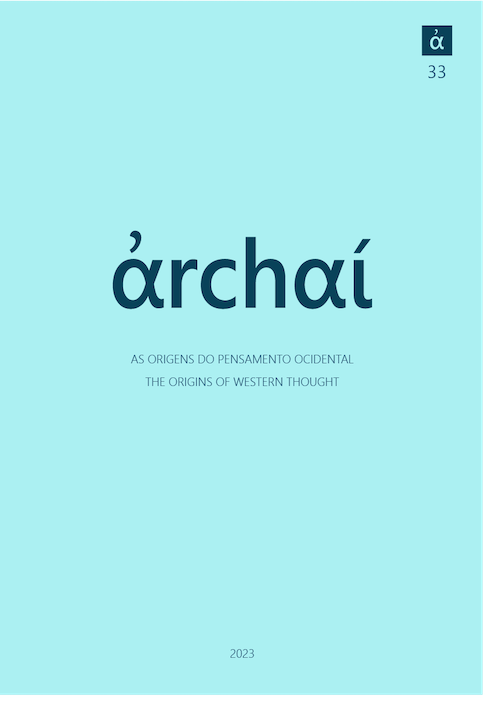Praecepta, decreta and happiness in Schopenhauer and Seneca: a short comparative study
DOI:
https://doi.org/10.14195/1984-249X_33_28Keywords:
Stoicism, Seneca, Virtue, Schopenhauer, PraeceptaAbstract
There is an important part in Schopenhauer's bibliography dedicated to reflections on a good life. Between 1826 and 1829, the German philosopher started to think about a eudemonology, an unfinished project, which relied on the rescue of the thought of ancient philosophers. In his discussions there is a great appreciation for Stoic thinking in order to produce a life as little unhappy as possible. Therefore, it seems relevant to revisit Schopenhauer's ideas and compare them with Seneca, who focused on the same topics: the appropriation of the concepts of praecepta and decreta and their connection with happiness.
Downloads
References
BARBOZA, J. (2005). Schopenhauer. O mundo como vontade e como representação São Paulo, Editora Unesp.
BARBOZA, J. (2009). Schopenhauer. Aforismos para a sabedoria de vida São Paulo, Martins Fontes.
BARBOZA, J. (2015). Schopenhauer. O mundo como vontade e como representação , Tomo II São Paulo, Editora Unesp .
BENEDETTI, I. C. (2009). Baltasar Gracián. A arte de prudência São Paulo, Martins Fontes .
BEZERRA, C. C. (2006). Sêneca e Schopenhuaer: A arte de ser feliz. Kalagatos, v. 3 n. 5, pp. 11-32.
BORGES, G. F. B. B.; BRUNETTO, B. O. S. (trad). (2020). Sêneca. Sobre os Benefícios, livro segundo. Hypnos, n. 44, pp. 95-179.
CACCIOLA, M. L. (2001). Schopenhauer. Sobre o Fundamento da Moral São Paulo: Martins Fontes.
CHEVITARESE, L. (2010). A eudemonologia empírica de Schopenhauer. In: REDYSON, Deyve (Org.). Arthur Schopenhauer no Brasil João Pessoa, Ideia, pp. 127-146.
DEBONA, V (2013). A outra face do pessimismo: entre a radicalidade ascética e sabedoria de vida Tese de doutorado. Universidade de São Paulo, São Paulo.
DEBONA, V. (2016). Caráter adquirido, sociabilidade e a moral do “como se” (Als-Ob) em Schopenhauer. Revista Trágica: estudos de filosofia da imanência, vol. 9, n. 1, pp.84-102.
DINUCCI, A. (2020). Epicteto. Diatribes de Epicteto, livro I Coimbra, Imprensa da Universidade de Coimbra.
DOBBIN (2008). Epicteto. Epictetus Discourses: book I Oxford, Clarendon.
FLEXCHER, M. (2005b). Schopenhauer. A arte de ser feliz São Paulo, Martins Fontes .
GOMES, C. H. (2000). Cícero. Dos Deveres Lisboa, Edições 70.
HALDANE, E. S. (trad.); BEISER, F. C. (intr.) (1955). Hegel. Lectures on the History of Philosophy, Vol. 1 London, Routledge & Kegan Paul LTD.
HEAD, J. (2016). Schopenhauer and the Stoics. Pli, The Warwick Journal of Philosophy, pp. 90-105.
J. A. SEGURADO E CAMPOS (trad.) (2014). Sêneca. Cartas a Lucílio Lisboa, Fundação Calouste Gulbenkian.
JANNINI, K. (trad.); (2007). Schopenhauer. Fragmentos sobre a história da filosofia São Paulo, Martins Fontes .
SAFRANSKI, R. (2011). Schopenhauer: E os anos mais selvagens da filosofia São Paulo, Geração Editorial.
VAIHINGER, H. (2021). The Philosophy of ‘As if’ Abingdon, Routledge Classic.
VANDENABEELE, B. (2015). The Sublime in Schopenhauer’s Philosophy London, Palgrave MacMillan.
VIESENTEINER, J. L. (2012). ‘Prudentia’ e o uso prático da razão em Schopenhauer. Revistas Voluntas: Estudos sobre Schopenhauer, vol. 3, n. 1 e n. 2, pp. 1-17.
Downloads
Published
How to Cite
Issue
Section
License
Copyright (c) 2023 George Felipe Bernardes Barbosa Borges

This work is licensed under a Creative Commons Attribution 4.0 International License.
Given the public access policy of the journal, the use of the published texts is free, with the obligation of recognizing the original authorship and the first publication in this journal. The authors of the published contributions are entirely and exclusively responsible for their contents.
1. The authors authorize the publication of the article in this journal.
2. The authors guarantee that the contribution is original, and take full responsibility for its content in case of impugnation by third parties.
3. The authors guarantee that the contribution is not under evaluation in another journal.
4. The authors keep the copyright and convey to the journal the right of first publication, the work being licensed under a Creative Commons Attribution License-BY.
5. The authors are allowed and stimulated to publicize and distribute their work on-line after the publication in the journal.
6. The authors of the approved works authorize the journal to distribute their content, after publication, for reproduction in content indexes, virtual libraries and similars.
7. The editors reserve the right to make adjustments to the text and to adequate the article to the editorial rules of the journal.



